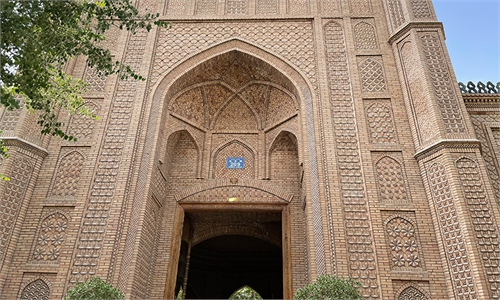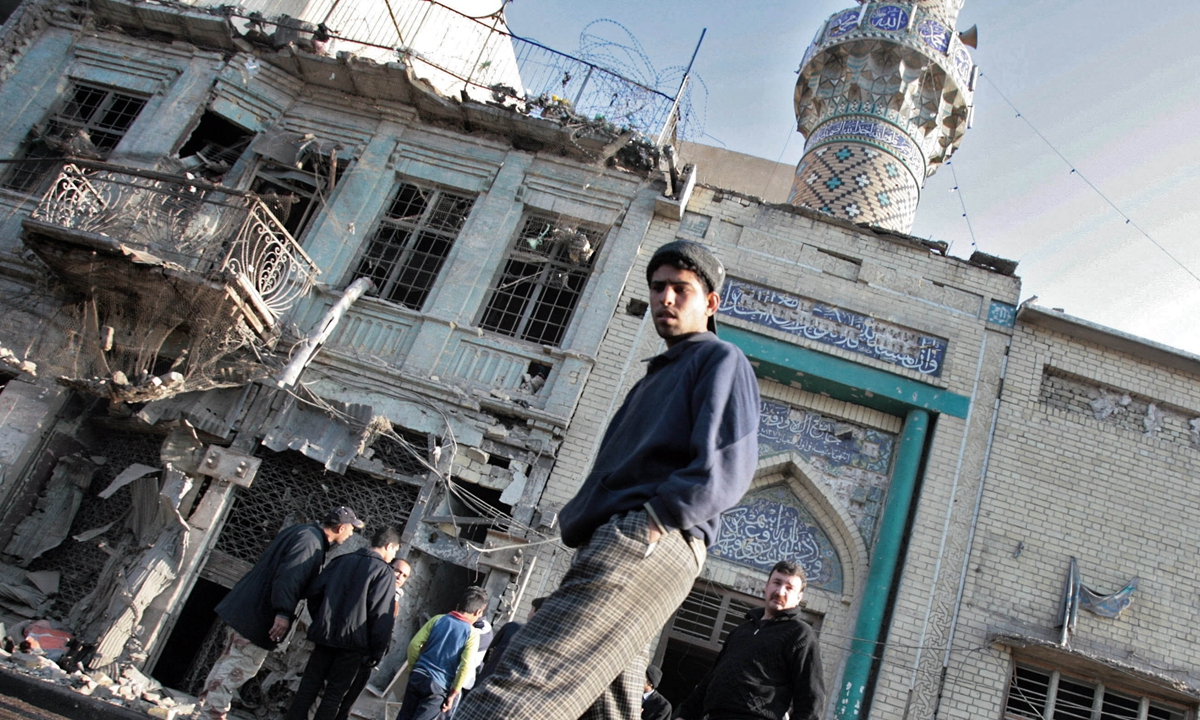
Onlookers gather at the site of a car bomb explosion in central Baghdad, January 18, 2007. Photo: AFP
Editor's Note:
How many evils have been committed in the name of democracy?
Exporting wars, launching "color revolutions," fomenting extremist ideologies, and promoting economic instability... The US has left endless trails of bloodshed and turmoil around the world. While the American "model of democracy" loses its shine, the US still attempts to establish exclusive cliques through the so-called democracy summit. To expose the true nature of "American democracy," the Global Times is publishing a series of articles to unmask the US' four democratic hegemonic sins. This is the third such piece.
For decades, the US has never stopped its interference in other countries' internal affairs in the name of upholding religious freedom; it destabilized entire nations, and incited opposition and division. It also continues to support "religious groups" and their leaders in various countries, transforming them into US agents for the spreading of its hegemonic gospel. Today, its failure is obvious, as more and more countries have come to oppose such interventionism on their domestic affairs, and on the other hand, jihadist and extremist groups have been on the increase and continued to spread to wider reaches of the globe thanks to the US' support - explicitly and covertly - when it took them as tools to control other nations.
Experts point out that as the US carries out an ideological expansion and tightens its hegemonic grip worldwide, religion has become one of the most important tools for its foreign intervention, and has also been used as a means to seek political power and economic control.
Moreover, its annual report on religious freedom, ostensibly an assessment of so-called religious human rights, is only in line with Washington's geopolitical stance.
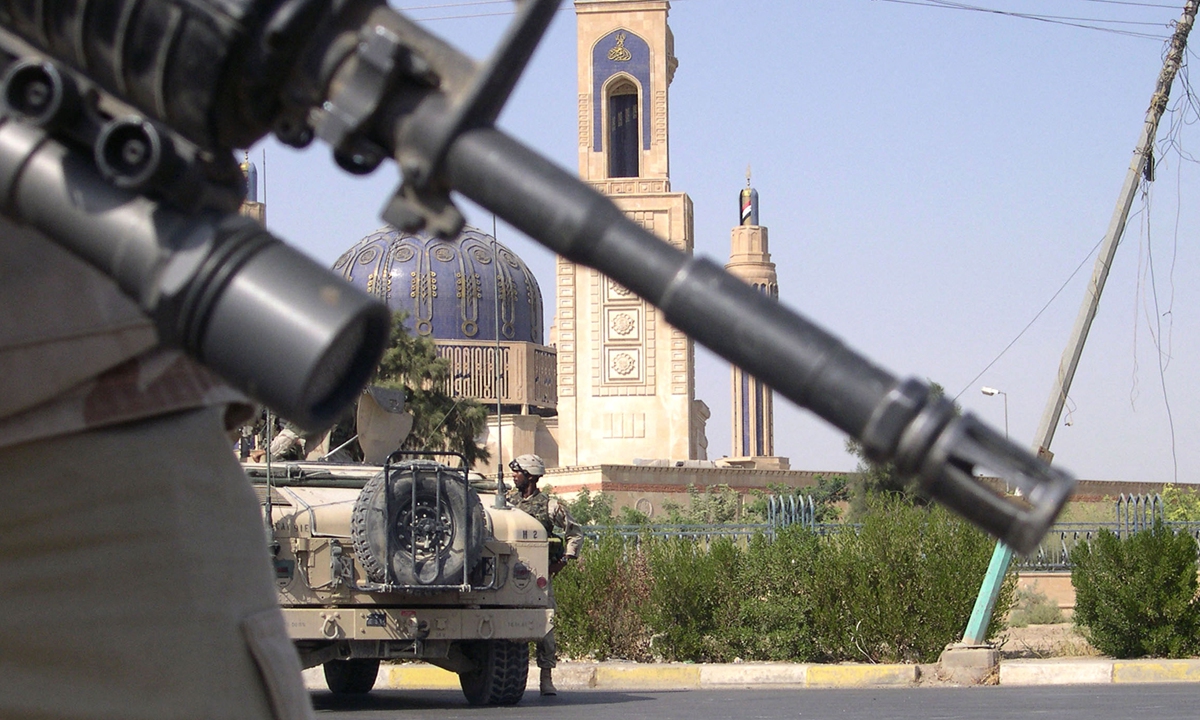
US soldiers cordon off the area due to a bomb threat following the Friday noon prayers at the Umm Qura mosque, the headquarters of the Association of Islamic Scholars, in west Baghdad 08 October 2004. Photo: AFP
Messing up religions
In the past decades, especially since the end of the Cold War, the revival of religions and subsequent religious conflicts have become important social phenomena in the international society. When analyzing these phenomena carefully, it is not that spiritual theism is at work, but that the social nature of religion is artificially elevated and strengthened. Religious theism is used by countries such as the US and certain interest groups as a means of seeking political power and economic benefits.
In January 2019, the Ukrainian Orthodox Church was declared independent, breaking off its centuries-old ties with the Russian Orthodox Church. But behind the split of the Russian Orthodox Church are political machinations.
Russian Foreign Minister Sergey Lavrov asserted in November that Washington has long attempted to press for a split in the Orthodox world, Tass reported.
The head of the schismatic Orthodox Church of Ukraine, or Epiphanius as regarded in the public, is said to be creating an organization that would have been impossible to govern without direct support from the US, according to Lavrov.
Observer said that the move, which could affect millions of followers, "is a big blow for Russia" and could lead to "serious conflict," the BBC reported.
The Orthodox split is one of many cases in which the US attempts to use religion as a tool to interfere in other countries' and regions' internal affairs in order to serve its international strategy.
The US is also directly behind some of the cult activities. For instance, the infamous Falun Gong sect has been alleged to be under the direction of the National Endowment for Democracy (NED), and received large amounts in funding.
Falun Gong has long been banned by the Chinese government in accordance with the law. A large number of facts have proven that Falun Gong is an anti-government and anti-people cult organization. The series of illegal activities planned and orchestrated by the organization are open provocations against democracy and legal systems, and endanger national security and social stability.
Moreover, the US, with its "Tibet Bill," used human rights and religion as excuses to distort and smear the development of the Xizang Autonomous Region in Southwest China, discredit China's ethnic and religious policies, and interfere with the tradition and order of the reincarnation of Living Buddhas.
"The fundamental purpose of the bill is to undermine the prosperity and stability of Xizang," Ji Rong, spokesperson at the Chinese Embassy in India, said in December 2020.
Inside the territory of the US, it is clear it has been using its own religion [Christian] to apply cultural protectionism and exclude foreign culture, immigrants, and different ethnicities, Zhuo Xinping, former director of Institute of World Religions of the Chinese Academy of Social Sciences, told the Global Times on Sunday.
The US also considers its mainstream culture or religion "universal value," and has been exporting it around the world, which formed a cultural hegemony that they used to interfere in the internal affairs and cultural development of other countries, Zhuo noted.
There is no such thing as so-called dominant, absolute "universal value." the exact same religion could be performed differently in different places, times, cultures, and by different ethnicities, Zhuo said, noting that the communication of religions should be based on sincerity, equality, and mutual respect, instead of aggressively indoctrinating others as a way of injecting their "universal values" to others, like what the West has long done.
It only shows power politics and systems of a hegemony, Zhuo said.
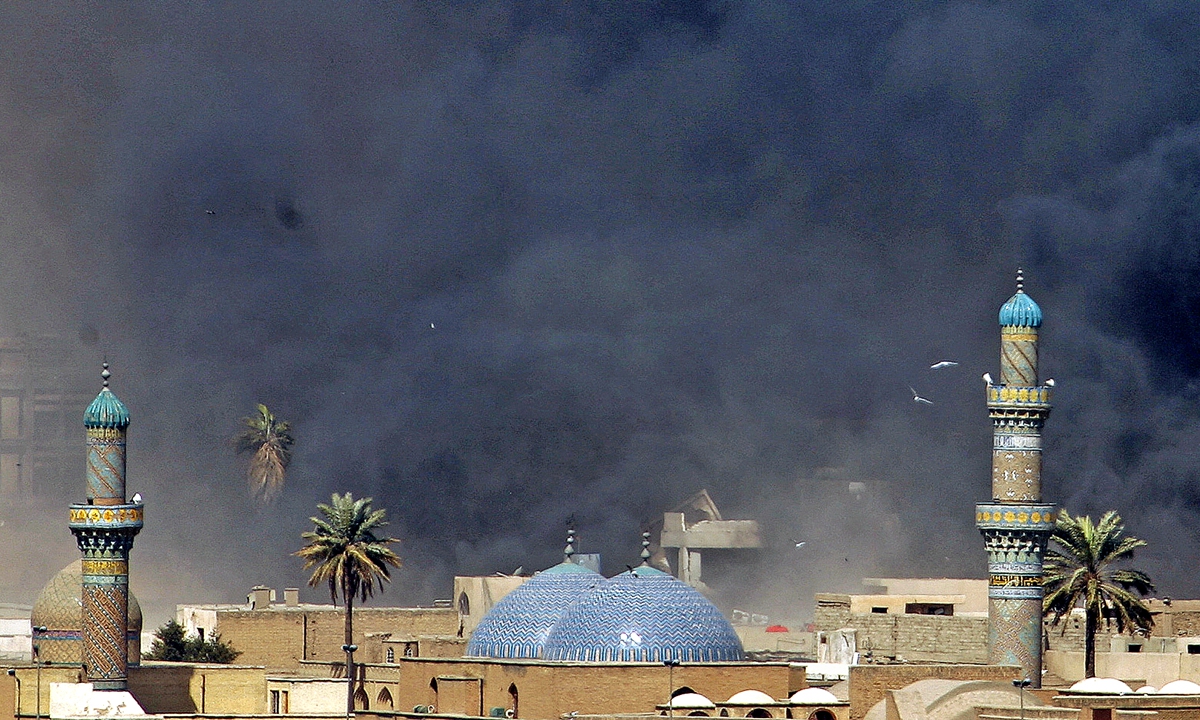
Smoke billowing from the site of a car bomb attack engulfs Bab al-Moazam Mosque in Baghdad on March 5, 2007. Photo: AFP
Cultivating extremism
The US, directly and indirectly, supports extremist religious forces in Central Asia and other regions under the guise of protecting religious freedom.
Absurdly, the US, the country that has killed the biggest number of Muslims across the world, has repeatedly said that they are attempting to protect the human rights of Muslims in Northwest China's Xinjiang Uygur Autonomous Region.
It is well known that notorious organizations such as the East Turkistan Islamic Movement (ETIM), the World Uyghur Congress (WUC), and the East Turkistan Education and Solidarity Association (ETESA) have long engaged in anti-China separatist activities both inside and outside China. From 1990 to 2016, the "three evil forces" - terrorism, extremism, and separatism - supported or directly participated by the above organizations, carried out or plotted thousands of violent and terror attacks in Xinjiang and other places, and engaged in anti-China separatist activities under the guise of religion, critically endangering the lives of local Muslims and other residents.
However, the US impugned the Chinese government's crackdown on these three evil forces as "oppression of Muslims."
As early as in 2002, ETIM was categorized as a terrorist organization and was added to the sanctions list under the United Nations Security Council Resolutions 1267 and 1390, however, former US president Donald Trump's administration removed it from the US' list of international terrorist organizations.
It once again exposed the US' double standards on counter-terrorism and its repulsive practice of condoning terrorist groups as it sees fit, said experts.
Another recent example is that Russia revealed, through evidence, the links between US officials and Islamic State militants, as data shows that the US cooperates with ISIS militants, such as in air strikes by the US Air Force targeting the positions of the Taliban troops that clashed with ISIS.
Russian Foreign Ministry Spokeswoman Maria Zakharova said on July 22 that Russia has many questions about unmarked helicopter flights, recorded since 2017, over the areas of activity of ISIS militants, especially in northern Afghanistan.
"According to Afghan sources, the helicopters were used to deliver reinforcements, weapons, and munitions, and to evacuate killed and wounded terrorists from battlefields… I should stress once again, this kind of activity was not possible without the knowledge of the United States and NATO, who completely controlled the Afghan air space."
The Syrian War is another example as the CIA is reported to have played an important role behind the scenes since 2012, coordinating arms shipments to the rebels by US allies, of which most ended up in the possession of militant jihadist groups, BBC reported.
Since 2014 when the US started to station troops in Syria, a large number of extremist religious forces appeared and committed atrocities in Syria's civil war. In order to overthrow Assad, the US has provided the weapons and equipment - through various channels to Syria's insurgency - many of which flew into the hands of extremist religious forces. The support has been consistent until now, sabotaging the peace process in the country.
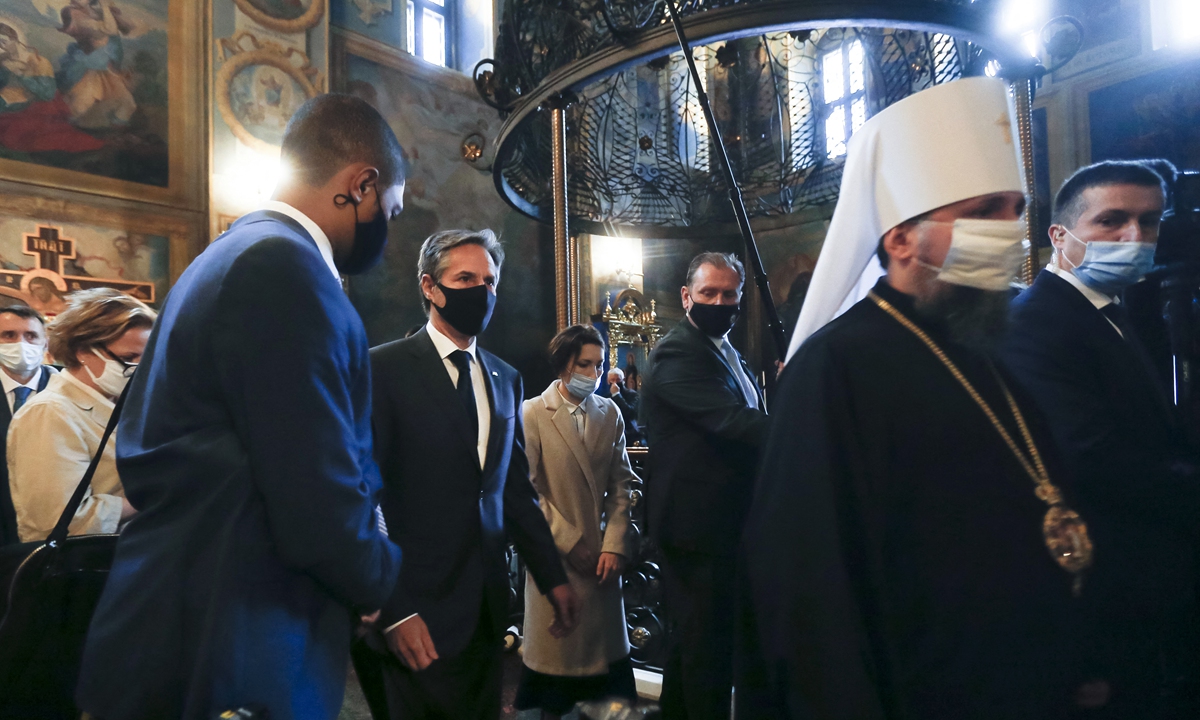
US Secretary of State Antony Blinken (C), accompanied by the Head of the Independent Ukrainian Church Metropolitan Epiphanius (R), visits a cathedral in Kiev, on May 6. Photo: AFP
Policing on others
In addition, the US government keeps meddling in the international human rights arena through the annual release of the so-called International Religious Freedom Report. But experts pointed out that it is based on the interest of the US government and serves to reinforce hegemonic values.
For example, in the 2002 International Religious Freedom Report, Myanmar, China, Iran, Iraq, North Korea, and Sudan were listed as "countries of special concern," however, the 2004 report removed Iraq from the list despite that in US-occupied Iraq, the "holy war" continued to kill, and the safety of the people was difficult to guarantee. Could there possibly be greater freedom of religious belief in such chaos? At least 660,000 Iraqi civilians have been killed since the US' invasion of Iraq in 2003, which has been criticized internationally as one of the worst humanitarian crises of the 21st century.
The Chinese Foreign Ministry in May 2021 slammed the US State Department's 2020 International Religious Freedom Report and its unilateral sanctions against two Chinese officials under the guise of so-called religious issues. "The so-called report, full of ideological prejudice, ignores the facts, wantonly slanders China's religious policy, and seriously interferes in China's internal affairs," the Foreign Ministry spokesperson said.
The annual report, which groundlessly lambasts the freedom of religious belief in China and viciously slandered China's religious policies, was met with general indignation among Chinese religious circles and numerous religious believers, said a statement issued by the secretariat of the joint conference of China's national religious groups in May 2020.
Spreading "religious freedom" around the world has become part of what Americans consider their mission and national interest, Cao Wei, an expert on security studies at Lanzhou University, told the Global Times. "However, such religious belief has gone beyond American sovereignty and goes toward interventionism. It is strongly connected to its geopolitical interests, and the 'double standards' are also blatantly obvious."
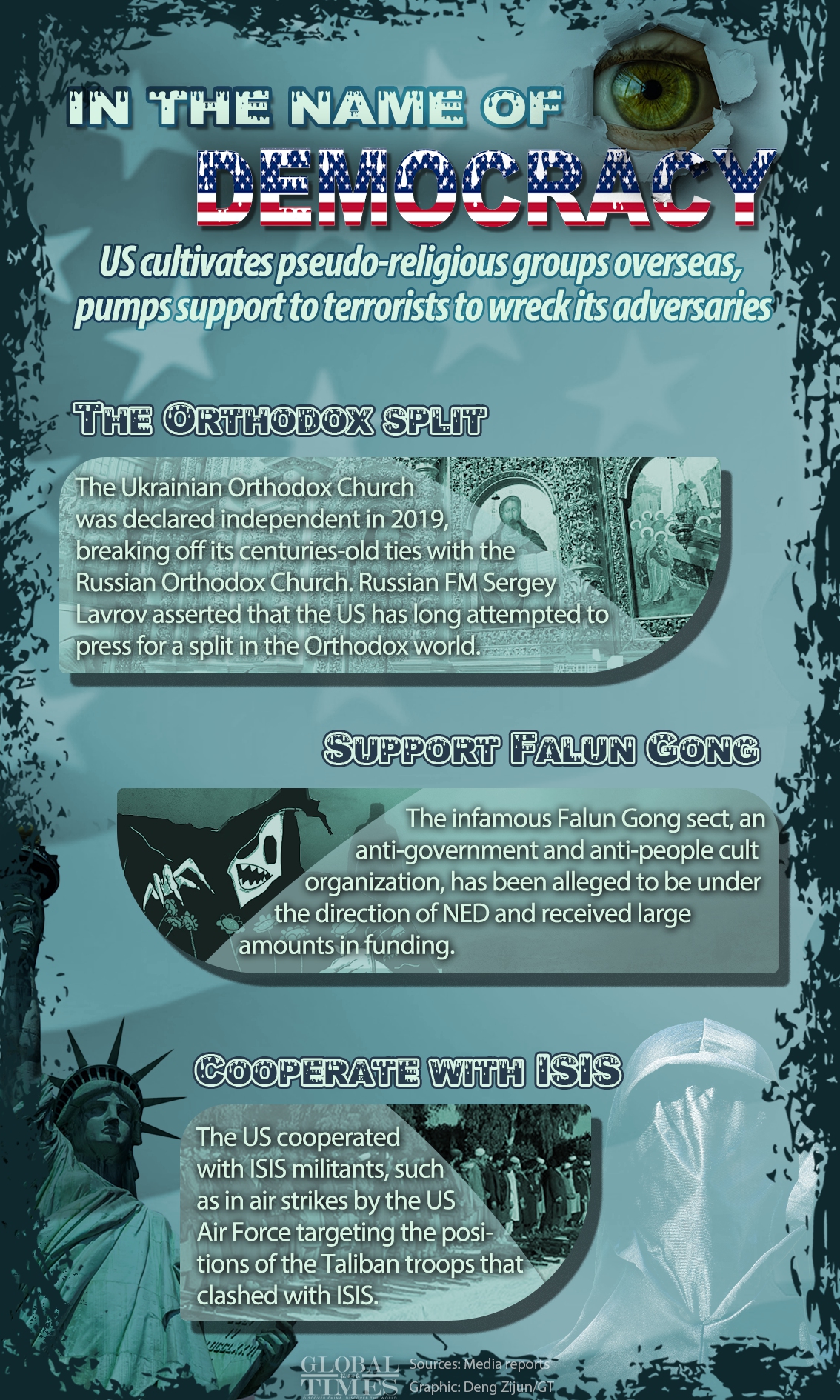
Graphic: Deng Zijun/GT
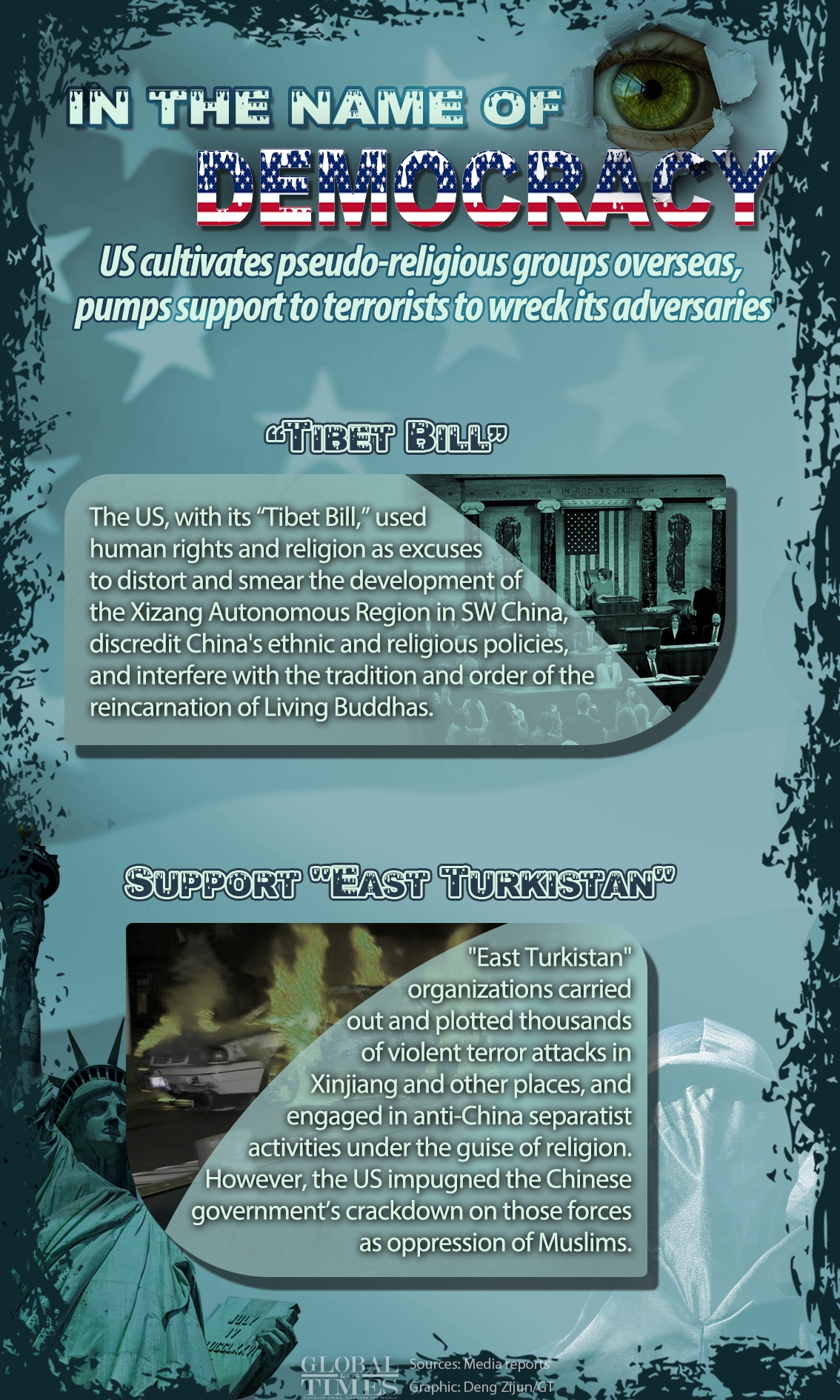
Graphic: Deng Zijun/GT

Onlookers gather at the site of a car bomb explosion in central Baghdad, January 18, 2007. Photo: AFP
Editor's Note:
How many evils have been committed in the name of democracy?
Exporting wars, launching "color revolutions," fomenting extremist ideologies, and promoting economic instability... The US has left endless trails of bloodshed and turmoil around the world. While the American "model of democracy" loses its shine, the US still attempts to establish exclusive cliques through the so-called democracy summit. To expose the true nature of "American democracy," the Global Times is publishing a series of articles to unmask the US' four democratic hegemonic sins.
This is the third such piece. The previous ones are: US war-mongering under guise of 'democracy' inflicts untold damage on the world; US wages global color revolutions to topple govts for the sake of American control; US' wanton sanctions deal humanitarian disasters in countries it dislikes.
For decades, the US has never stopped its interference in other countries' internal affairs in the name of upholding religious freedom; it destabilized entire nations, and incited opposition and division. It also continues to support "religious groups" and their leaders in various countries, transforming them into US agents for the spreading of its hegemonic gospel. Today, its failure is obvious, as more and more countries have come to oppose such interventionism on their domestic affairs, and on the other hand, jihadist and extremist groups have been on the increase and continued to spread to wider reaches of the globe thanks to the US' support - explicitly and covertly - when it took them as tools to control other nations.
Experts point out that as the US carries out an ideological expansion and tightens its hegemonic grip worldwide, religion has become one of the most important tools for its foreign intervention, and has also been used as a means to seek political power and economic control.
Moreover, its annual report on religious freedom, ostensibly an assessment of so-called religious human rights, is only in line with Washington's geopolitical stance.

US soldiers cordon off the area due to a bomb threat following the Friday noon prayers at the Umm Qura mosque, the headquarters of the Association of Islamic Scholars, in west Baghdad 08 October 2004. Photo: AFP
Messing up religions
In the past decades, especially since the end of the Cold War, the revival of religions and subsequent religious conflicts have become important social phenomena in the international society. When analyzing these phenomena carefully, it is not that spiritual theism is at work, but that the social nature of religion is artificially elevated and strengthened. Religious theism is used by countries such as the US and certain interest groups as a means of seeking political power and economic benefits.
In January 2019, the Ukrainian Orthodox Church was declared independent, breaking off its centuries-old ties with the Russian Orthodox Church. But behind the split of the Russian Orthodox Church are political machinations.
Russian Foreign Minister Sergey Lavrov asserted in November that Washington has long attempted to press for a split in the Orthodox world, Tass reported.
The head of the schismatic Orthodox Church of Ukraine, or Epiphanius as regarded in the public, is said to be creating an organization that would have been impossible to govern without direct support from the US, according to Lavrov.
Observer said that the move, which could affect millions of followers, "is a big blow for Russia" and could lead to "serious conflict," the BBC reported.
The Orthodox split is one of many cases in which the US attempts to use religion as a tool to interfere in other countries' and regions' internal affairs in order to serve its international strategy.
The US is also directly behind some of the cult activities. For instance, the infamous Falun Gong sect has been alleged to be under the direction of the National Endowment for Democracy (NED), and received large amounts in funding.
Falun Gong has long been banned by the Chinese government in accordance with the law. A large number of facts have proven that Falun Gong is an anti-government and anti-people cult organization. The series of illegal activities planned and orchestrated by the organization are open provocations against democracy and legal systems, and endanger national security and social stability.
Moreover, the US, with its "Tibet Bill," used human rights and religion as excuses to distort and smear the development of the Xizang Autonomous Region in Southwest China, discredit China's ethnic and religious policies, and interfere with the tradition and order of the reincarnation of Living Buddhas.
"The fundamental purpose of the bill is to undermine the prosperity and stability of Xizang," Ji Rong, spokesperson at the Chinese Embassy in India, said in December 2020.
Inside the territory of the US, it is clear it has been using its own religion [Christian] to apply cultural protectionism and exclude foreign culture, immigrants, and different ethnicities, Zhuo Xinping, former director of Institute of World Religions of the Chinese Academy of Social Sciences, told the Global Times on Sunday.
The US also considers its mainstream culture or religion "universal value," and has been exporting it around the world, which formed a cultural hegemony that they used to interfere in the internal affairs and cultural development of other countries, Zhuo noted.
There is no such thing as so-called dominant, absolute "universal value." the exact same religion could be performed differently in different places, times, cultures, and by different ethnicities, Zhuo said, noting that the communication of religions should be based on sincerity, equality, and mutual respect, instead of aggressively indoctrinating others as a way of injecting their "universal values" to others, like what the West has long done.
It only shows power politics and systems of a hegemony, Zhuo said.

Smoke billowing from the site of a car bomb attack engulfs Bab al-Moazam Mosque in Baghdad on March 5, 2007. Photo: AFP
Cultivating extremism
The US, directly and indirectly, supports extremist religious forces in Central Asia and other regions under the guise of protecting religious freedom.
Absurdly, the US, the country that has killed the biggest number of Muslims across the world, has repeatedly said that they are attempting to protect the human rights of Muslims in Northwest China's Xinjiang Uygur Autonomous Region.
It is well known that notorious organizations such as the East Turkistan Islamic Movement (ETIM), the World Uyghur Congress (WUC), and the East Turkistan Education and Solidarity Association (ETESA) have long engaged in anti-China separatist activities both inside and outside China. From 1990 to 2016, the "three evil forces" - terrorism, extremism, and separatism - supported or directly participated by the above organizations, carried out or plotted thousands of violent and terror attacks in Xinjiang and other places, and engaged in anti-China separatist activities under the guise of religion, critically endangering the lives of local Muslims and other residents.
However, the US impugned the Chinese government's crackdown on these three evil forces as "oppression of Muslims."
As early as in 2002, ETIM was categorized as a terrorist organization and was added to the sanctions list under the United Nations Security Council Resolutions 1267 and 1390, however, former US president Donald Trump's administration removed it from the US' list of international terrorist organizations.
It once again exposed the US' double standards on counter-terrorism and its repulsive practice of condoning terrorist groups as it sees fit, said experts.
Another recent example is that Russia revealed, through evidence, the links between US officials and Islamic State militants, as data shows that the US cooperates with ISIS militants, such as in air strikes by the US Air Force targeting the positions of the Taliban troops that clashed with ISIS.
Russian Foreign Ministry Spokeswoman Maria Zakharova said on July 22 that Russia has many questions about unmarked helicopter flights, recorded since 2017, over the areas of activity of ISIS militants, especially in northern Afghanistan.
"According to Afghan sources, the helicopters were used to deliver reinforcements, weapons, and munitions, and to evacuate killed and wounded terrorists from battlefields… I should stress once again, this kind of activity was not possible without the knowledge of the United States and NATO, who completely controlled the Afghan air space."
The Syrian War is another example as the CIA is reported to have played an important role behind the scenes since 2012, coordinating arms shipments to the rebels by US allies, of which most ended up in the possession of militant jihadist groups, BBC reported.
Since 2014 when the US started to station troops in Syria, a large number of extremist religious forces appeared and committed atrocities in Syria's civil war. In order to overthrow Assad, the US has provided the weapons and equipment - through various channels to Syria's insurgency - many of which flew into the hands of extremist religious forces. The support has been consistent until now, sabotaging the peace process in the country.

US Secretary of State Antony Blinken (C), accompanied by the Head of the Independent Ukrainian Church Metropolitan Epiphanius (R), visits a cathedral in Kiev, on May 6. Photo: AFP
Policing on others
In addition, the US government keeps meddling in the international human rights arena through the annual release of the so-called International Religious Freedom Report. But experts pointed out that it is based on the interest of the US government and serves to reinforce hegemonic values.
For example, in the 2002 International Religious Freedom Report, Myanmar, China, Iran, Iraq, North Korea, and Sudan were listed as "countries of special concern," however, the 2004 report removed Iraq from the list despite that in US-occupied Iraq, the "holy war" continued to kill, and the safety of the people was difficult to guarantee. Could there possibly be greater freedom of religious belief in such chaos? At least 660,000 Iraqi civilians have been killed since the US' invasion of Iraq in 2003, which has been criticized internationally as one of the worst humanitarian crises of the 21st century.
The Chinese Foreign Ministry in May 2021 slammed the US State Department's 2020 International Religious Freedom Report and its unilateral sanctions against two Chinese officials under the guise of so-called religious issues. "The so-called report, full of ideological prejudice, ignores the facts, wantonly slanders China's religious policy, and seriously interferes in China's internal affairs," the Foreign Ministry spokesperson said.
The annual report, which groundlessly lambasts the freedom of religious belief in China and viciously slandered China's religious policies, was met with general indignation among Chinese religious circles and numerous religious believers, said a statement issued by the secretariat of the joint conference of China's national religious groups in May 2020.
Spreading "religious freedom" around the world has become part of what Americans consider their mission and national interest, Cao Wei, an expert on security studies at Lanzhou University, told the Global Times. "However, such religious belief has gone beyond American sovereignty and goes toward interventionism. It is strongly connected to its geopolitical interests, and the 'double standards' are also blatantly obvious."

Graphic: Deng Zijun/GT

Graphic: Deng Zijun/GT
